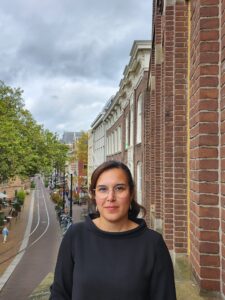November 29, 2023
Failing Accountability in Palestine and Israel
The new episode of Justice Visions addresses the escalating violence in Palestine and Israel following the Hamas attacks on October 7th and Israel’s assault on the Gaza Strip. In a context where international crimes are occurring in an environment where impunity prevails, the episode zooms in on debates about justice and accountability, highlighting questions that have not been covered extensively elsewhere.
The episode features four eminent international lawyers, each offering unique perspectives on issues related to accountability. Ben Saul is the special UN rapporteur on human rights and counter-terrorism. Sari Bashi is the program director at Human Rights Watch and founded the Israeli NGO Gisha, focusing on freedom of movement for civilians in Gaza. Nada Kiswanson is the MENA specialist for Impunity Watch who represented Palestinian victims at the ICC. Shawan Jabarin is the director of Al-Haq, one of the leading Palestinian human rights organizations.
The current conflict is unprecedented because of the number of civilian casualties and the type of weapons used during Israel’s military campaign. Shawan stresses that the possibility of a genocide is unfolding. “Some of the families were erased completely and were even dissolved from the civil registration file, because the whole family was killed.” He stresses that Israel attacks residential areas infrastructure intentionally, “taking revenge against civilians for political reasons”. Nada concurs that Israel appears to inflict maximum amount of destruction and suffering, underscoring “the allegedly disproportionate and indiscriminate bombing of innocent Palestinians in their homes, the dehumanization of Palestinians by Israeli political and military leaders calling, for example, for the erasure of Gaza, referring to Palestinians as human animals, as well as attacks against refugee camps and medical facilities.”
These crimes, however do not take place in a vacuum. We must examine them against the background of a prolonged occupation, and a situation of apartheid. As Sari highlights, “Human Rights Watch has followed the lead of Palestinian human rights organizations and intellectuals in concluding that the Israeli government is carrying out the crimes against humanity of apartheid and persecution against Palestinians. A significant element of those crimes is the quest for Jewish demographic supremacy in the land between the river and the sea. This includes, for example, not letting refugees return. 70% of Gaza’s population are refugees. These are people who have, for 75 years, not been allowed to return to the areas in Israel which their parents and grandparents fled or were expelled from.”
The prevailing impunity in Palestine and Israel is shocking. Ben Saul stresses that both sides have a poor record in holding their forces accountable, highlighting the need to conduct international investigations. In practical terms, the International Criminal Court (ICC) stands out as the independent mechanism with a mandate to prosecute international crimes available for Palestinians. But even if the ICC has been investigating the situation for some years, Ben Saul sees “a pretty stark difference between the speed with which the ICC prosecutor mobilized resources as soon as the latest round of the Ukraine war broke out” and the slow pace that characterizes procedures in Palestine.
As Israel has refused to cooperate with the Court, and many states attempted to limit the Court’s reach, the Court is de facto blocked. As Nada stresses, what is needed is “political will to support the ICC fully without compromise, and also to complement the court by enabling domestic courts’ exercise of universal jurisdiction over grave crimes committed in Palestine. Simply, accountability has to be considered an integral part of any transition towards peace.”
More information about the speakers
Sari Bashi, Program Director at Human Rights Watch, leads the organization’s research. Prior to joining HRW, Sari co-founded and ran Gisha, the leading Israeli human rights group promoting the right to freedom of movement for Palestinians in Gaza. She has taught international humanitarian law at Yale Law School and Tel Aviv University and supervised research at Democracy for the Arab World Now. She is the author of Maqluba: Upside Down Love (Hebrew) and of the Umm Forat blog about raising her children in the occupied West Bank.

Sari Bashi
Nada Kiswanson is a lawyer specializing in international criminal and human rights law who has worked extensively on Israel’s occupation of Palestine. Over the past decade, she worked with Palestinian civil society at various institutions, such as the UN, EU and ICC and also represented hundreds of Palestinian victims in judicial proceedings before the ICC Pre-Trial Chamber. She is currently a MENA specialist with Impunity Watch. Nada co-edited and contributed to the volume Prolonged Occupation and International Law: Israel and Palestine, released by BRILL earlier this year. Her latest opinion piece is The Wheels of Justice Must Also Turn for Palestinians.

Nada Kiswanson
Shawan Jabarin is a Palestinian human rights defender, General Director of the Palestinian human rights organization Al-Haq. From 2005 to 2009, Shawan was a member of the Board of Directors of Defense for Children International – Palestine, the national section of the Geneva-based Defense for Children International. He is also a member of Human Rights Watch Middle East Advisory Board. He was Amnesty International’s first Palestinian Prisoner of Conscience, and he has worked for years promoting human rights in the face of Israeli occupation of the Palestinian territories.

Shawan Jabarin
Professor Ben Saul is Challis Chair of International Law at the University of Sydney and the United Nations Special Rapporteur on human rights and counter-terrorism. He has taught at Harvard, Oxford, The Hague and Xiamen Academies of International Law, in Italy, India, Nepal, and Cambodia. He has published 20 books and hundreds of scholarly articles. Moreover, he has advised UN bodies, governments, militaries, security agencies, and NGOs; practiced in international tribunals; undertaken missions in over 35 countries; and appears frequently in the international media.

Professor Ben Saul
September 21, 2023
Institutional innovation and victim participation in transitional justice
The new season of the Justice Visions podcast focuses on the issue of victim participation, mobilization and resistance. This dedicated focus aligns with the overarching theme of the Justice Visions conference, taking place in March 2024. Our first episode centers on institutional innovation and its symbiotic relationship with victim participation. This is a dynamic interplay where, on one hand, formal transitional justice mechanisms shape various transitional justice processes with significant implications for victims. On the other, formal mechanisms increasingly engage with victim participation, which is seen as an essential requirement for achieving the goals of transitional justice.
We talk about this interplay between formal and informal avenues and the topic of institutional change with Dr. Brianne McGonigle Leyh, who is affiliated with the Netherlands Institute of Human and Utrecht’s University’s School of Law. Brianne has been working extensively on international criminal law, transitional justice and victims’ rights. Recently, her work zooms in on aparadigmatic cases, examining transitional justice initiatives in the United States. In Brianne’s words, “there are new ways of using the language of transitional justice, using the language of human rights to advance a cause that meets the needs and concerns of community actors and community members. So, when we see even traditional processes being used to advance justice for historical harms, I think that’s brilliant.”
Reflecting on her extensive research journey, Brianne talks about the evolution of participatory rights across the pillars of transitional justice. She emphasizes: “I definitely think we’ve seen major changes in the past 20, 15, even 10 and 5 years. Participation has become so integral, not just in transitional justice. Actually, even in the broader field of human rights law, participation has become absolutely integral. There’s an expression, I believe it was first used in disability rights: “Nothing about us without us”. And we’ve seen that phrase really spread to so many different groups and communities that have long fought for these participatory rights.” This “participatory turn” has left an indelible mark on institutional structures and processes established during times of transition.

Dr. Brianne McGonigle Leyh is an Associate Professor with the Netherlands Institute of Human Rights and Montaigne Centre on Rule of Law and Administration of Justice at Utrecht University’s School of Law. Her specializations include human rights law, international criminal law, transitional justice, victims’ rights, and documentation and accountability for serious human rights violations.
June 30, 2023
Re-imagining victimhood and victim participation in transitional justice
In this special episode of the Justice Visions podcast we go back to the core of the Justice Visions research project and explore important evolutions in how we think about the complex notions of victimhood and victim participation within the field of transitional justice.
Together with Cheryl Lawther and Tine Destrooper, we talk how the recent expansion of transitional justice, the diverse range of contexts in which it is implemented, and the growing attention to diverse knowledge approaches, shaped our understanding of these complex concepts in different contexts.
The notion of victimhood itself is central to Cheryl’s forthcoming book ‘Beyond Innocence and Guilt: Constructing Victimhood in Transitional Justice’. In this episode, she argues that when we’re thinking about victimhood in transitional justice we need to engage with a much bigger range of thematic issues:
How is victimhood constructed in relation to, for example, what voices do we hear, and what voices do we not hear? What happens when we perhaps freeze victims and survivors in one particular narrative and treat that one experience in their life as their total identity, their total voice? (…) and what about what about the forms of victimhood that we don’t see, or we don’t hear?
This position also has implication for how we think about victim participation in formal and informal spaces of transitional justice, which is the focus of Tine Destrooper’s work. As she explains in this episode, victim participation in transitional justice can be both a locus and a driver of transformative change, if it is developed in ways that are meaningful for those who experienced harm:
Meaningful participation foregrounds lived experiences and can be a way to facilitate reflexive understandings of rights that underpin various agendas for justice or redress.
How to organize participation in a meaningful way, however, requires a better understanding of how people who experienced violence navigate and negotiate or reshape or reject participation in transitional justice, how formal spaces shape informal spaces and vice versa, etc. As Tine argues in the podcast, ‘There are a lot of relational dynamics related to participation that we need to understand better’.
These questions will also be discussed in more detail during the international ERC conference Victims and Transitional Justice: Participation. Mobilisation. Resistance, organised by Justice Visions in Ghent in March 2024.
June 12, 2023
The revolutionary potential of transitional justice: Transitional justice, arts and protest in South Sudan
The final episode of the Justice Visions miniseries on the revolutionary potential of transitional justice zooms in on the relationship between protest, artistic practices and transitional justice in South Sudan. This might seem not be the most obvious choice for such a miniseries, as transitional justice is a relatively new concept in the world’s youngest nation, which has endured decades of violence.
South Sudan gained independence in 2011, following more than 20 years of civil war, and subsequently experienced another civil war from 2013 to 2020. In response to the legacies of these conflicts, both formal and informal transitional justice initiatives have been established. While the peace agreements put forward four transitional justice measures, none of these foreseen measures became operational. In the absence of functioning formal transitional justice mechanisms, the artistic realm has emerged as an incubator for contestation and resistance.
We are exploring the way in which artistic practices further both TJ and protest with Sayra van den Berg. Sayra has recently conducted fieldwork in South Sudan, focusing on contemporary artistic and cultural expressions, notably in the domain of visual arts and music. She describes how several artists share goals with the transitional justice advocacy community, even if they do not self-identify as TJ actors, arguing that,
While I don’t necessarily think that there is an intrinsic benefit in adopting the language of transitional justice for these artistic spaces, I do think that there’s a very real relational benefit to being a part of this wider transitional justice community that using that language grants access to.
Delving into the vibrant artistic landscape, she describes arts’ potential for innovation in TJ spaces and discussions. Scholars and practitioners can act upon this:
The increasingly critical turn in scholarship around formal mechanisms of transitional justice is a call to action for all of us in this incredibly fluid and evolving field of research, to locate the practice of transitional justice in the spaces where its goals are centralized and not merely within a rather static and narrow set of formal mechanisms.

May 30, 2023
Transitional Justice and Reparations for Slavery and its Ongoing Legacy in the United States
The new episode of the Justice Visions podcast is the third episode of a mini-series that looks into the revolutionary potential of transitional justice in current protests, when social movements movement use it in non-scripted innovative ways. In this episode we examine how US-based activists demanding reparations for slavery and its ongoing legacy, tap into the disruptive potential of transitional justice language and initiatives.
Together with our studio guest, professor Joyce Hope Scott, we reflect on the nature of the current reparations debate in the US, unearthing its long history and global reach, as well as activists reasons for sometimes relying on the rhetoric of transitional justice.
Through a focus on the work of INOSAAR we unpack some of the most pressing public misconceptions about reparations and reparative justice, as well as about the very history of enslavement. As professor Scott argues,
We see an inseparable connection between the African continent: those who stayed and those who left. […] Because what we are, is epistemological orphans. So there’s a whole effort of research and of reconnection that we do at the level of Indigenous knowledge to broaden the struggle and make it more effective. So the conversation gets much bigger, much more global. And the implication behind this idea of transitional justice is that this is not going to happen again, that there will be healing.
As such the episode does not only examine what transitional justice can mean for the current struggle for reparations, but also what the innovations, reconceptualizations and new approaches developed as part of this struggle may mean for more mainstream transitional justice.

Professor Joyce Hope Scott is a clinical professor of African-American and black diaspora studies at Boston University. She’s also a co-founder of the International Network of Scholars and Activists for Afrikan Reparations (INOSAAR), is an international network dedicated to reparations and to other forms of transitional justice for the enslavement and the genocide of peoples of African descent. She is the author of numerous publications including: “Reparations, Restitution, Transitional Justice” in the Journal Of World-Systems Research.




